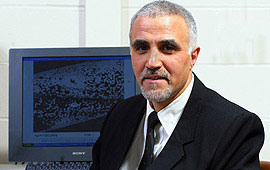| Jun 16, 2011 | |
UDayton researcher named "Carbon Ambassador" |
|
| (Nanowerk News) University of Dayton materials researcher Khalid Lafdi has two goals as a newly selected carbon "ambassador" for the American Carbon Society — recruit a new generation of carbon researchers and show researchers there are no limits to the fields benefitting from carbon technology. | |
 Khalid Lafdi "My mission is twofold. I want to help recruit a new generation of young carbon scientists and engineers, and I want to help seasoned researchers understand even better how carbon properties have changed as its perspective has changed in scale from macro to micro to nano – transitions that occurred out of necessity to meet new technological challenges," said Lafdi, whom the American Carbon Society selected as its George D. Graffin Lecturer in 2014. "There are no limits to the number of fields that will benefit from carbon nanotechnology – energy management, thermal management, health care and medicine are just the beginning."< He intends to present between 20 and 25 lectures, tutorials or seminars to university students and members of faculty, industry and science and engineering societies in North America. He also has started to recruit collaborators for a national-scale carbon workshop he hopes to see held in Dayton in 2012. Lafdi, a Wright Brothers Institute Endowed Chair in Nanomaterials in the School of Engineering and group leader for carbon materials in the University's Research Institute, also will promote carbon science and technology, highlighting in particular the notable advances in carbon research and development in Ohio and elsewhere the last 40 years. |
|
| "We're in the carbon era, but this is not your grandfather's carbon," Lafdi said. "We are working with an entirely new generation of carbon materials that have grown out of advances in nanotechnology, and it's an incredibly exciting time in science." | |
| But the field is advancing so quickly that not everyone is up to speed on new technologies, a problem he wants to help remedy, Lafdi added. | |
| "Researchers are spending time trying to solve problems that have already been solved. It's important to make everyone aware of work that has already been done – even as early as the 1950s – so they can spend their energies on the challenges that still need addressed," Lafdi said. | |
| Lafdi has made significant contributions to the field of carbon materials, including the recent invention of Nano Adaptive Hybrid Fabric (NAHF-X), a tailored nanomaterial capable of being produced in quantities large enough to make them viable and affordable for large-scale commercial use. He holds four patents and has licensed three nano-manufacturing technologies to Ohio companies. During his 10 years at the University, Lafdi helped establish the University's Nanoscale Engineering Science and Technology facility, the Research Institute's Carbon Research Lab, a thermal management lab and a manufacturing transition facility at the National Composites Center in Kettering, Ohio. | |
| He also has published more than 140 articles and chapters in refereed journals and edited four books in nanocomposites and thermal management. |
| Source: University of Dayton |
